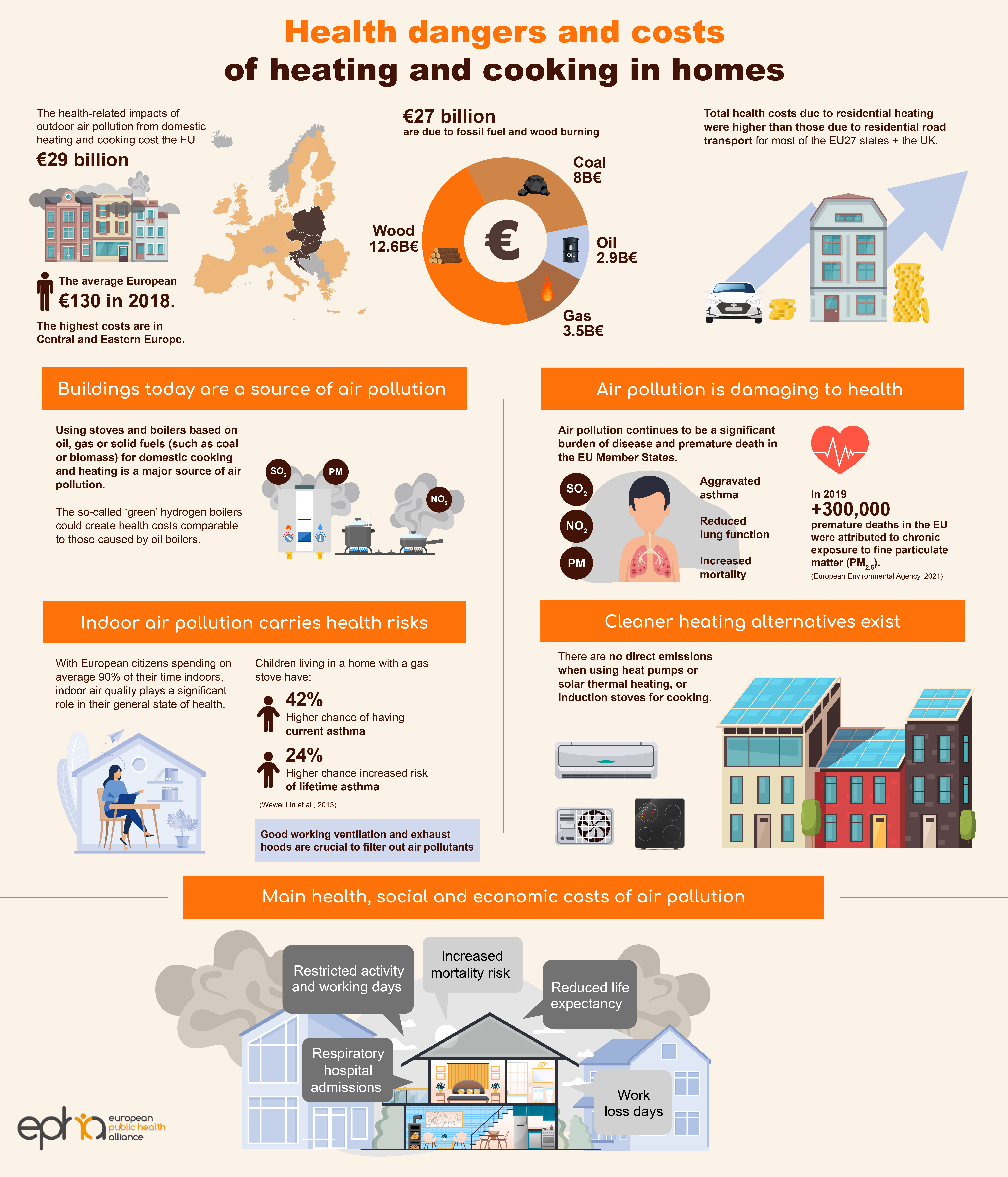A new report by CE Delft for EPHA investigates the health-related costs to society of outdoor air pollution caused by residential heating and cooking, looking at the impact of different air pollutants across the EU’s 27 Member States and the UK, with an in-depth analysis on four individual countries: Italy, Poland, Spain and the UK.
The total health-related costs to society of outdoor air pollution due to residential heating and cooking activities by households in Europe amounted to € 29 billion in 2018. This translates into a cost of 130 €/year for an average European household. Most costs (94%) relate to direct emissions that arise at home from fossil fuel and biomass based techniques, with wood and coal being the main contributors.
Air pollution is the single greatest environmental risk to health, by causing stroke, heart disease, lung cancer, and both chronic and acute respiratory diseases, including asthma. Such health effects lead to economic and welfare losses due to lower life expectancies, illness, greater healthcare spending and lower productivity, which are accounted for in the report’s calculations of social costs.
The report concludes that in order to lower the health damages due to air pollution, it is necessary to direct policies towards it. Consideration of transport and industrial sources of air pollution is widespread, however residential use for heating and cooking is also an important source, making up 84% of total household energy use. Addressing this, EPHA has published a position paper outlining 6 key european and national level policy recommendations that would enable this transition:
- Ambient Air Quality Directives – its revision should reflect the scientific evidence on health and air quality: the EU’s air quality standards should be aligned with the 2021 WHO Global Air Quality Guidelines by 2030 at the latest.
- The Ecodesign Directive: measures should give more weight to health considerations, including by setting stringent pollutant limits for heating and cooking appliances and by phasing out the sale of health damaging products (such as gas stoves and fossil fuel boilers).
- The Energy Performance of Buildings Directive (EPBD): the proposed revision of indoor air quality should become an integral part of building planning and development, including by introducing higher ventilation requirements for buildings with gas hobs. In addition, there should be a European ban on incentives for fossil fuel boilers as soon as possible, by 2025 at the latest.
- Health and climate policies should be better integrated for maximum co-benefits. For example, stricter conditions and sustainability criteria should be used to considerably limit the use of biomass, the burning of which has significant negative health consequences.
- The health community and the public should be empowered to take action on air quality. There is a clear role for health workers to play in awareness campaigns and in informing decision-makers’ positions in order to build a regulatory environment that protects everyone’s health.
- Vulnerable households must be protected and supported through targeted policies and dedicated funds.

The press release and position paper were updated on 23 May, following a revision of the CE Delft study.
Key References to the CE Delft Study
Home wood burning in UK causes £1bn of health costs a year, report says (The Guardian)
Health impacts of wood burning cost EU and UK €17 billion a year(New Scientist)
Riscaldamento e fumi della cucina: l’inquinamento domestico costa caro alla salute
(La Repubblica, Green and Blue)
L’inquinamento dell’aria costa 180 euro/anno a famiglia di spese sanitarie (Huffpost IT)

